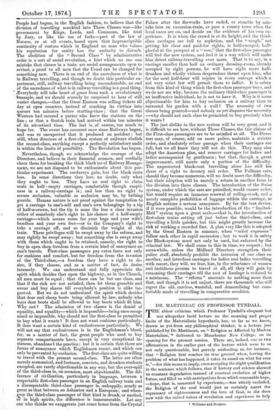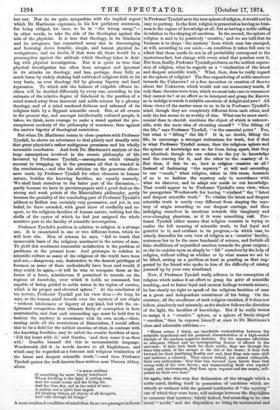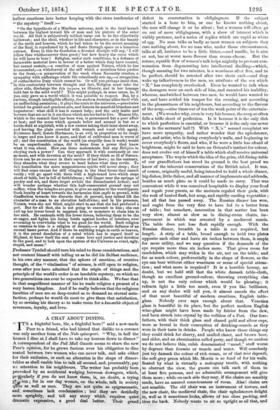DR. MARTINEAU ON PROFESSOR TYNDALL.
THE ablest criticism which Professor Tyndall's eloquent but not altogether lucid lecture on the meaning and proper limits of the Materialistic hypothesis, has, so far as we know, drawn as yet from any philosophical thinker, is a lecture just published by Dr. Martineau, on " Religion as Affected by Modern Materialism,"* delivered to Manchester New College, on its opening for the present session. There are, indeed, one or two affirmations in the earlier part of the lecture which seem to us not only questionable, but gravely misleading, as, for instance, that " Religion first reaches its true ground when, leaving the problem of what has happened, it takes its stand on what for ever is,"—for this seems to imply, even accepting the slight qualification in the sentence which follows, that if history and science showed us constant degradation instead of constant evolution of higher forms, and filled us with anticipations from which reasonable hope, —hope, that is, measured by experience,—was utterly excluded, the Religion of the soul would just as certainly assert the supremacy of righteousness and the love of God, as she does now with the united voices of revelation and experience to help
• Williams and Norgate.
her out. Nor do we quite sympathise with the implied regret 'which Dr. Martineau expresses, in his few prefatory sentences, for being obliged, for once, to be in "the wrong camp,"—
in other words, to take the side of the theologian against the side of the physicist. It is true that theology, in its blindness and its arrogance, has committed many sins in discouraging and frowning down humble, simple, and honest physical in- vestigations ; and no doubt, if that were all, there would be a presumption against the attitude which theology takes in deal- ing with physical investigation. But it is quite as true that
physical investigation has often been arrogant and ignorant in its attacks on theology, and has, perhaps, done fully as ranch harm by rudely shaking half-cultivated religious faith to its very basis, as ever theology did by gloomy bigotry and hard
repression. To which side the balance of culpable offence in- clines will be decided differently by every one, according to his estimate of the relative degree of falsehood in the position of a mind scared away from innocent and noble science by a gloomy theology, and of a mind rendered dubious and ashamed of its religious faith by a flippant scientific creed. But, at all events in the present day, and amongst intellectually cultured people, it takes, we think, more courage to make a stand against the pre- sumptuous modesty of the philosophy of nescience, than against the narrow bigotry of theological restriction.
But when Dr. Martineau comes to close quarters with Professor Tyndall, he shows no reluctance to deal plainly and steadily with that great physicist's rather ambiguous premisses and his wholly untenable conclusion. And- both Dr. Martineau's analysis of the large assumptions involved in the atomic philosophy of life favoured by Professor Tyndall,—assumptions which virtually amount to wrapping up in the premisses all that is .wanted in the conclusions;—and also his criticism on the generous allow- ance made by Professor Tyndall for other elements in human nature, besides the knowing faculties, are equally masterly. We shall limit ourselves to the latter part of the discussion,— partly because we have in previous papers said a good deal on the strong and weak points' of the Materialistic philosophy, partly because the geniality of the concluding part of Professor Tyndall's address at Belfast was certainly very persuasive, and yet, in our belief, he there awarded, with great show of cordiality and re- spect, to the religious faculties of human nature, nothing but the shells of the oyster of which he had just assigned the whole nutritive part to the faculty of scientific investigation.
Professor Tyndall's position in relation to religion is a strange one. It is enunciated in one or two different forms, which we will here cite. Men of science, he says, "fail to touch that immovable basis of the •religious sentiment in the nature of man. To yield this sentiment reasonable satisfaction is the problem of problems at the present hour. And grotesque in relation to scientific culture as many of the religions of the world have been and are,—dangerous, nay, destructive to the dearest privileges of freemen as some of them undoubtedly have been and would, if they could, be again,—it will be wise to recognise them as the forms of a force, mischievous if permitted to intrude on the regions of knowledge, over which it holds no command, but capable of being guided to noble issues in the region of emotion, which is its proper and elevated sphere." At the conclusion of his lecture, Professor Tyndall put his view thus :—So long, he
says, as the human mind broods over the mystery of our origin " without intolerance or bigotry of any kind, but with the en- lightened recognition that ultimate fixity of conception is here
unattainable, and that each succeeding age must be held free to fashion the mystery in accordance with its own needs,—then, casting aside all the restrictions of Materialism, I would affirm this to be a field for the noblest exercise of what, in contrast with the knowing faculties, may be called the creative faculties of men.
Fill thy heart with it,' said Goethe, and then name it as thou wilt' Goethe himself did this in untranslatable language. Wordsworth did it in words known to all Englishmen, and which may be regarded as a forecast and religious vitalisation of the latest and deepest scientific truth,"—and then Professor Tyndall quotes the well-known lines written near Tintern Abbey, about "a sense sublime Of something far more deeply interfused Whose dwelling is the light of setting suns, And the round ocean, and the living air, And the blue sky, and in the mind of man : A motion and a spirit that impels All thinking things, all objects of all thoughts, And rolls through all things."
A more Confused condition of mind than these two passages indicate
in Professor Tyndall as to the true sphere of religion, it would not be easy to portray. In the first, religion is presented as having no busi- ness in the region of knowledge at all, but as having a noble calling in relation to the shaping of emotions. In the second, the sphere of religion is said to be positively creative,' and we are told that its business is to shape the mystery' from which man has emerged, at will, according to our needs,—on condition it takes full care to admit that those needs do not in all probability correspond to the mysterious fact, but change with every mind that ponders over it. But then, finally, Professor Tyndall produces, as the noblest expres- sion of religion, what he regards as a "vitalisation of the latest and deepest scientific truth." What, then, does he really regard as the sphere of religion? The free engendering of noble emotions towards the Unknown? or a free invention or creation of theories about the Unknown, which would suit our momentary needs, if only these theories were true, which we must take care to remereoer they cannot be? or an effort so to interpret and grasp the Known as to indulge towards it suitable emotions of delight and awe? All these views of the matter seem to us to lie in Professor Tyndall's mind, though they are completely different from each other, and only the last seems to us worthy of him. What can be more senti- mental than to cherish emotions the object of which is unknow- able, with the mere idea of elevating oneself ? " The lifting of the life," says Professor Tyndall, "is the essential point." Yes, but what is " lifting" the life ? It is, no doubt, lifting the life, to encourage a stronger enthusiasm for truth, but if that is what Professor Tyndall means, then- the religious sphere and the sphere of knowledge are so far• from being apart, that they are identical, though the one relates to the joy in knowledge and the craving for it, and the other to the mastery of it. But then, if this be so, how is religion creative at all ? Instead of fashioning "the •mystery " at will and •according to our "needs," what religion, taken in this- sense, demands of us is to fashion the mystery only in accordance with what we discover, and to adapt our needs to our knowledge. That would appear to be Professor Tyndall's own view, when he panegyrises Wordsworth for having " vitalised " the "latest and deepest scientific truth." To vitalise the latest and deepest scientific truth is surely very different from shaping the mys- tery of origin according to our deepest cravings, and then indulging ourselves in emotions towards this imaginary and ever-changing phantom, as if it were something real. Pro- fessor Tyndall either means that 'religion consists in trying to realise the full meaning of scientific truth, to feel loyal and grateful to it, and exultant in its progress,—in which case, he utterly discredits his own view of religion as a ' creative' faculty, sentences her to be the mere handmaid of science, and forbids all false ebullitions of unjustified emotion towards the great enigma ; or else he enjoins upon us simply to " lift " ourselves by the help of religion, without telling us whither or by what means we •are to be lifted, setting us a problem at least as pending as that sug- gested by the friend who spoke to bim of the difficulty of raising yourself up by your own waistband.
Now, if Professor Tyndall really adheres to the conception of religion which makes it an effort to grasp the spirit of scientific teaching, and to foster loyal and earnest feelings towards science, he has clearly no right to speak of the religious faculties of man as a great and independent constituent of his being. On the contrary, all the excellence of such religion vanishes, if it does not follow, absolutely and minutely, as the shadow follows the direction of the light, the faculties of knowledge. But if he really means to assign it a " creative " sphere, or a sphere of freely-shaped " emotion," then he exposes himself at once to Dr. Martineau's close and admirable criticism :— " Hence arises, I think, an inevitable contradiction between the scientific hypothesis and the personal characteristics of a high-souled disciple of the modern negative doctrine. For his supreme affections no adequate Object and no corresponding Source is offered in the universe : if they look back for their cradle, they see through the fores tthe cabin of the savage or the lair of the brute; if they look forward for their justifying Reality and end, they fling vain arms aloft and embrace a vacancy. They cannot defend, yet cannot relinquish, their own enthusiasm: they bear him forward upon heroic lines that sweep wide of his own theory ; and transcending their own reputed origin and environment, they float upon vapours and are empty, self- poised, by their own heat."
Or again, take this very fine delineation of the struggle which a noble mind, finding itself in possession of emotions which are utterly at variance with the general tendencies of "the mystery out of which they were born, will undergo between the disposition to construe that mystery, falsely indeed, but according to its own moral "needs," and the disposition to bring its sentimental and
hollow emotions into better keeping with the stern tendencies of " the mystery" itself :—
" On the hypothesis of a Mindless universe, such is the fatal breach between the highest inward life of man and his picture of the outer world. All that is subjectively noblest turns out to be the objectively hollowed ; and the ideal, whether in life and character, or in the beauty of the earth and heaven, which he had taken to be the secret meaning of the Real, is repudiated by it, and floats through space as a homeless outcast. Even in this its desolation a devoted disciple will say, I will follow thee whithersoever thou goest ;' but how heavy the cross which he will have to bear I Religion, under such conditions, is a defiance of inexorable material laws in favour of a better which they have created, but cannot sustain,—a reaction of man against Nature, which he has transcended,—a withdrawal of the self which a resistless force pushes to the front,—a preservation of the weak whom Necessity crushes, a sympathy with sufferings which life relentlessly sets up,—a recognition of authoritative Duty which cannot be. Cr will you perhaps insist that, in this contrariety between thought and fact, Religion must take the other side, discharge the 67e4 ha .ra as illusory, and in her homage hold fast to the solid world ? This might perhaps, in some sense, be, if you only gave us a world which it was possible to respect. But, by a curious, though intelligible affinity, the modern doctrine allies itself with an unflinching pessimism ; it plays the cynic to the universe —penetrates behind its grand and gracious airs, and detects its manifold and impostures: what skill it has it cannot help ; and the only faults and horrors that are not in it are those which are too bad to live.-- Human life, which is the summit that has been won, is pronounced but a poor affair at best; and the scene which spreads below and around is but as a battle-field at nightfall, with a few victors taking their faint shout away, and leaving the plain crowded with wounds and vocal with agony. Existence itself, insists Hartmann, is an evil, in proportion as its range is larger and you know it more, and that of cultivated men is worst of all ; and the constitution of the world (so stupidly does it work) would be an unpardonable crime, did it issue from a power that knew what it was about. How can these malcontents find any Religion in obeying such a power? Can they approach it with contumely at one moment, and with devotion at the next ? If they think so ill of Nature, there can be no reverence in their service of her laws ; on the contrary, they abandon what they revere to bend before what they revile. To this humiliation the more magnanimous spirits will never stoop ; they will find some excuse for still clinging to the ideal forms they cannot verify ; will go apart with them with a high-toned love which stops short of faith, but is full of faithfulness ; will linger near the springs of poetry and art, and there forget awhile the disenchanted Actual; and will wonder perhaps whether this half-consecrated ground may not suffice, when the temples are gone, to give an asylum to the worshippers. Such loyalty of heart towards the harmonies that ought to prevail, with disaffection towards the discords that do prevail, may indeed lift the character of a man to an elevation half-divine; and in his presence, Nature, were she not blind, might start to, see that she had produced a god. But for all that, she is not going to succumb to bim; she can call up her lower brood to suppress him, or monsters to chain him to her rock. He contends with the lower forces, believing them to be the stronger, and fights his losing battle against hordes of inferiors, ever swarming to overwhelm what is too good,for the world. Such religion as remains to him is a religion of despair,—a pathetic defiance of an eternal baser power. And if there be anything tragic in earth or heaven, it is the proud desolation of a mind which has to regard itself as Highest, to know itself the seat of some love and justice and devotion to the good, and to look upon the system of the Universe as cruel, ugly, stupid, and mean."
Professor Tyndall should turn his mind to these considerations, and not content himself with telling us as he did his Belfast audience, in his own airy manner, that the sphere of emotion, of creative thought., of the vitalisation" of science, is still open to religion, even after you have admitted that the origin of things and the principle of the world's order is an insoluble mystery, on which no two generations can ever be expected to think alike. We fear that in that magnificent manner of his he made religion a present of a very barren kingdom. And if he really believes that the religious faculties of men are so deep-rooted as to demand an eternal satis- faction, perhaps he would do most to give them that satisfaction, by so revising his theory as to make room for a knowable object of reverence, loyalty, and love.




































 Previous page
Previous page